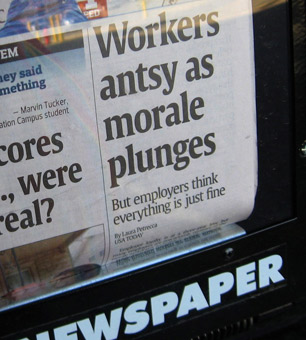Did you know that Truthout is a nonprofit and independently funded by readers like you? If you value what we do, please support our work with a donation.
Economists at the University of Massachusetts and elsewhere have thoroughly discredited research suggesting that cutting government spending will promote economic growth during a time of recession. Even while scholarship has exposed the fallacy of austerity economics and this news has reached wide audiences through Twitter and the Colbert Report, the United States government is embracing austerity’s policy prescriptions. While employment has barely kept up with the growth of the labor force and the best measure of the unemployment rate (which accounts for those who have given up on looking for work or who work part time because they can’t find full time employment) remains stuck at 14%, the federal, state and local governments are slashing payrolls and reducing spending in order to meet arbitrary deficit targets. The ghost of bad austerity economics continues to haunt, and even to drive, the living.
In 2007 and 2008, as we entered the Great Recession, economists knew what should be done to prevent another Great Depression. Drawing on theory developed in the shadow of the Great Depression, Keynesian economists argued that government needed to spend to fill the gap when private spending and investment contracted during an economic crisis. The work of Milton Friedman, Anna Schwartz, and their students and followers, had persuaded monetary authorities that they needed to act aggressively to provide liquidity to prevent a financial system meltdown. There was a politics here. On the left, those who favored a large public sector and a generous social wage seized on the opportunity created by fiscal stimulus to boost public spending while conservatives and their Wall Street allies favored monetary policy because it subsidized banks while avoiding public spending.
These disputes were put aside after the financial market collapse in the Fall of 2008 when both Friedman monetarists and Keynesian fiscalists stared into the abyss. For a brief moment, economists and policy makers joined in recommending that we walk on both legs and use all the tools available to prevent the Great Recession from becoming a full-fledged Depression. In striking contrast with the experience of the early 1930s, the Federal Reserve aggressively pushed liquidity into the banking system, and the new Obama Administration pushed an $800 billion stimulus program through Congress. While the Obama stimulus was much smaller than Keynesian economists recommended, and was further diminished by political bargaining that substituted tax cutting for some needed spending, it did provide funds for infrastructure and for local and state programs threatened by the plunge in state and local revenues that resulted from the recession. Together with the Federal Reserve’s actions, the Obama stimulus prevented a complete economic collapse.
The stimulus worked well enough that some economists quickly forgot why it was enacted. Already in 2009, some were denouncing stimulus spending. They defended the Great Recession and its attendant suffering in terms reminiscent of Andrew Mellon’s appreciative analysis of the effects of the Great Depression: “liquidate labor, liquidate stocks, liquidate farmers, liquidate real estate . . . It will purge the rottenness out of the system.” They quickly won over the Republican Party; hating Obama, Republicans never saw any reason to promote economic recovery on his watch. And when Obama’s stimulus did not cure all ills, they blamed it for those that remained; post hoc ergo propter hoc.
With Republicans in control of the House of Representatives, in a position to block action in the Senate, and in control of many state governments, it has been impossible to prevent spreading austerity. Sensible economists, of which there are a few even outside of Amherst, have condemned spending cuts and tax increases as the wrong policy during an economic recession. But the debate is no longer about economics; those who oppose fiscal stimulus do so from a sense of moral outrage. Advocates of austerity like the Tea Party Patriots have little rational argument about the economics of government stimulus spending but a strong sense of grievance that others are getting away with something. They assume that the allocations of a free market are just and fail to see the substantial benefits they (and all of us) receive from public spending; they conclude, therefore, that government help must be bad because in giving to those who need help, government is subsidizing the wicked. While we can show them that their economic analysis is wrong, it will have little effect on those whose real goal is not to help the needy or to comfort the afflicted but to punish the guilty.
Trump is silencing political dissent. We appeal for your support.
Progressive nonprofits are the latest target caught in Trump’s crosshairs. With the aim of eliminating political opposition, Trump and his sycophants are working to curb government funding, constrain private foundations, and even cut tax-exempt status from organizations he dislikes.
We’re concerned, because Truthout is not immune to such bad-faith attacks.
We can only resist Trump’s attacks by cultivating a strong base of support. The right-wing mediasphere is funded comfortably by billionaire owners and venture capitalist philanthropists. At Truthout, we have you.
Truthout has launched a fundraiser, and we have only 24 hours left to raise $17,000. Please take a meaningful action in the fight against authoritarianism: make a one-time or monthly donation to Truthout. If you have the means, please dig deep.
